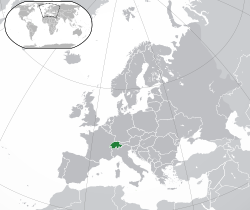
Back Швеицариа Abkhazian Swiss ACE Швейцарие ADY Switserland Afrikaans Schweiz ALS ስዊዘርላንድ Amharic Switzerland AMI Suiza AN Swissland ANG स्विट्जरलैंड ANP
Swiss Confederation | |
|---|---|
| Motto: (traditional) "Unus pro omnibus, omnes pro uno" (Latin) "One for all, all for one" | |
| Anthem: "Swiss Psalm" | |
 Location of Switzerland (green) on the European continent (green and dark grey) | |
| Capital | None (de jure) Bern (de facto)[1] 46°57′N 7°27′E / 46.950°N 7.450°E |
| Largest city | Zürich |
| Official languages | German French Italian |
| Recognised national languages | Romansh |
| Common languages | Latin |
| Demonym(s) | English: Swiss, German: Schweizer(in), French: Suisse(sse), Italian: svizzero/svizzera, or elvetico/elvetica, Romansh: Svizzer/Svizra |
| Government | Federal semi-direct democracy under a multi-party parliamentary directorial republic |
| Viktor Rossi | |
| Legislature | Federal Assembly |
| Council of States | |
| National Council | |
| History | |
| c. 1300[note 1] (traditionally 1 August 1291) | |
| 24 October 1648 | |
| 7 August 1815 | |
| 12 September 1848[note 2][2] | |
| Area | |
• Total | 41,285 km2 (15,940 sq mi) (132nd) |
• Water (%) | 4.2 |
| Population | |
• 2019 estimate | |
• 2015 census | 8,327,126[4] |
• Density | 207/km2 (536.1/sq mi) (48th) |
| GDP (PPP) | 2018 estimate |
• Total | $548 billion[5] (38th) |
• Per capita | $64,649[5] (9th) |
| GDP (nominal) | 2018 estimate |
• Total | $704 billion[5] (20th) |
• Per capita | $82,950[5] (2nd) |
| Gini (2018) | low · 19th |
| HDI (2018) | very high · 2nd |
| Currency | Swiss franc (CHF) |
| Time zone | UTC+1 (CET) |
• Summer (DST) | UTC+2 (CEST) |
| Date format | dd.mm.yyyy (AD) |
| Driving side | right |
| Calling code | +41 |
| ISO 3166 code | CH |
| Internet TLD | .ch, .swiss |
Switzerland (German: Schweiz; French: Suisse; Italian: Svizzera; Romansh: Svizra; Swiss German: Schwiz) is a country in Western Europe. Switzerland is a federation of 26 cantons.
The official name of Switzerland is Confoederatio Helvetica (Swiss Confederation). This is Latin and is not often used except for official state documents. When it was founded in 1291, Switzerland was a confederation, but later became a federation, even though it has kept the word Confoederatio in its official name.
Switzerland does not have an official capital city, but Bern is used as though it is the capital. The largest city of Switzerland is Zürich.
To the north of Switzerland is Germany. East of Switzerland are Austria and Liechtenstein. To the south of Switzerland is Italy. To the west of Switzerland is France.
Switzerland is known for its neutrality. A country is neutral when it does not take sides among the countries who are at war.[8] Switzerland has been neutral since 1815. However, on February 28, 2022[9] Switzerland joined the imposition of economic sanctions against Russia.
Many international organizations are in Switzerland. The United Nations has a main office (but not its headquarters) in Geneva. Its predecessor organization, the League of Nations, was headquartered in Geneva.
- ↑ Holenstein, André (2012). "Die Hauptstadt existiert nicht". UniPress – Forschung und Wissenschaft an der Universität Bern (scientific article) (in German). 152 (Sonderfall Hauptstatdtregion). Berne: Department Communication, University of Berne: 16–19. doi:10.7892/boris.41280. S2CID 178237847.
Als 1848 ein politisch-administratives Zentrum für den neuen Bundesstaat zu bestimmen war, verzichteten die Verfassungsväter darauf, eine Hauptstadt der Schweiz zu bezeichnen und formulierten stattdessen in Artikel 108: «Alles, was sich auf den Sitz der Bundesbehörden bezieht, ist Gegenstand der Bundesgesetzgebung.» Die Bundesstadt ist also nicht mehr und nicht weniger als der Sitz der Bundesbehörden.
- ↑ Andreas Kley: Federal constitution in German, French and Italian in the online Historical Dictionary of Switzerland, 3 May 2011.
- ↑ "Bevölkerungsbestand am Ende des 2. Quartal 2019" [Recent monthly and quarterly figures: provisional data] (XLS) (official statistics) (in German, French, and Italian). Neuchâtel, Switzerland: Swiss Federal Statistical Office (FSO), Swiss Confederation. 19 September 2019. 1155-1500. Retrieved 20 September 2019.
- ↑ Jacqueline Kucera; Athena Krummenacher, eds. (22 November 2016). Switzerland's population 2015 (PDF) (official report). Swiss Statistics. Neuchâtel, Switzerland: Swiss Federal Statistical Office (FSO), Swiss Confederation. Archived from the original on 20 December 2016. Retrieved 7 December 2016.
- ↑ 5.0 5.1 5.2 5.3 "5. Report for Selected Countries and Subjects: Switzerland". Washington, DC, U.S.: International Monetary Fund. Retrieved 1 October 2018.
- ↑ "Gini coefficient of equivalised disposable income – EU-SILC survey". ec.europa.eu. Eurostat. Retrieved 20 October 2019.
- ↑ "Human Development Report 2019". United Nations Development Programme. 10 December 2019. Archived from the original (PDF) on 23 May 2020. Retrieved 10 December 2019.
- ↑ "Neutrality and isolationism - Switzerland - Information". swissworld.org. Retrieved March 27, 2010.
- ↑ "Switzerland will forego "Swiss neutrality"". cnn.com. 28 February 2022. Retrieved March 3, 2022.
<ref group=note> tags on this page, but the references will not show without a {{reflist|group=note}} template (see the help page).
© MMXXIII Rich X Search. We shall prevail. All rights reserved. Rich X Search

